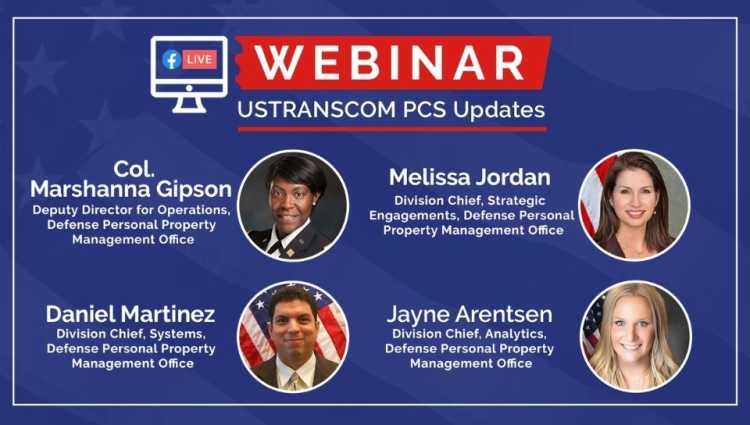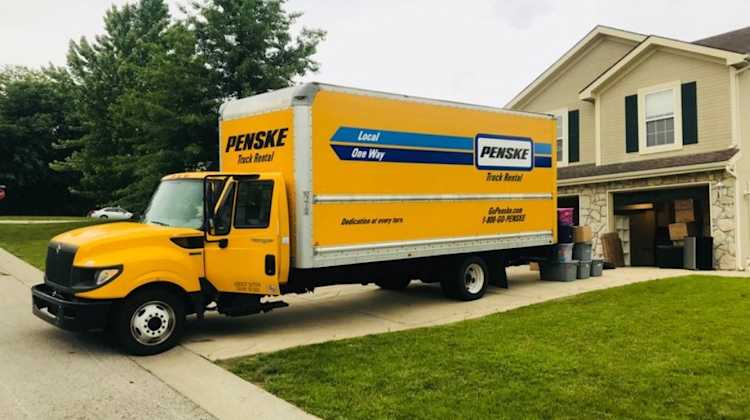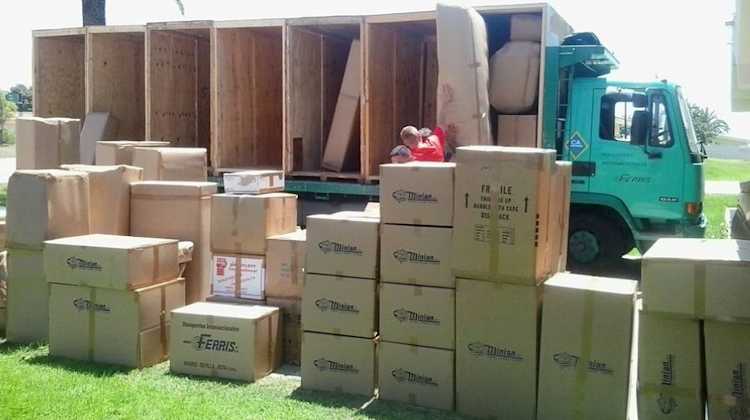Webinar: PCS Updates with USTRANSCOM
by Lizann Lightfoot - January 6th, 2022

Guests from US Transportation Command (TRANSCOM):
Col. Marshanna Gipson, the Deputy Director of Operations for the Defense Personal Property Management Office since 2019.
Danny Martinez, the Systems Division Chief for the Defense Personal Property Management Office, who played a role in preparing the Global Housing Goods Contract, making sure all the requirements were inline. I have worked in this program for about 15 years, always trying to make the program better.
Melissa Jordan, Division Chief of Strategic Engagements for the Defense Personal Property Management Office.
Jayne Arentsen, the Analytics Division Chief for the Defense Personal Property Management Office.
Let’s discuss claims. What should military families expect when working through the claims process, and where should they turn with issues?
Col Gipson: We are either hearing that customer’s things haven’t arrived on time, or things have arrived damaged. The TSP should have reached out to you to communicate with the customer and let them know what is happening with their shipment. The moving company should also provide the customer with information about how to file an inconvenience claim, so if your things arrive late you can be compensated for purchasing 7 days of essentials to establish your residence. Remember, the receipts policy changed in 2020, so contact your chain of command and local office with your questions.
When your shipment arrives, do an initial walk-through with the moving company to look for any existing damage to walls or flooring, then also check again after everything has been moved in.
Once the movers have unpacked or placed things once on a flat surface, you may discover that items are lost, damaged, or missing. Assess all of that, document everything you notice. You now have more than 75 days to assess damage, so you now have up to 180 days to leisurely unpack and check for any missing or damaged items. This gives you more time to get settled and get the family in school, etc, so you can do a thorough check of everything. Then provide notice to the moving company letting them know you intend to file a claim. You have 180 days to provide that notice, and have a total of 9 months after the delivery date to file that claim with the TSP.
Do as much as you can while the moving crew is in the house, so you can fill out the form for things that were damaged or missing upon delivery.
If the company doesn’t want to pay you the full price for a damaged item, there is room to reject the offer and provide more info about the full value of the item. Don’t reject the whole claim in DPS just because of one disagreement. If you agree on some parts of the claim, then accept the claim for those items so the claim can be closed out. Then transfer your claim to the Military Claims Office for the remaining contested items so they can help you work through that.
We’ve been hearing a lot about supply chain issues and labor shortages. How might this impact military families PCSing?
Col. Gipson: We continue to be impacted by the pandemic. Last summer, things went smoother than expected after the Stop Move order. This summer, on the other side of the pandemic, we are working with our industry partners to try to smooth out those impacts. It’s important to manage expectations. We are not exempt from everything occurring in the economy, but we are doing our best to keep lines of communication open. We continue to emphasize to our industry to only accept those shipments that they are able to handle in a timely manner that they can handle with a safe and competent crew. We would rather see members reach full capacity and do quality relocation efforts, rather than have shipments rushed and broken because of an inexperienced crew.
If a shipment is canceled, talk to your local transportation office. They will know and understand the most about the local environment and restraints in your local community. Also talk to your chain of command about potentially pushing back a report date. We don’t want customers to feel like they are forced to do a PPM, because not everyone is physically able to do that.
As of November 1st, families will no longer go to Move.mil for their move process. They will instead go to Military OneSource. What’s the difference between these sites?
Melissa Jordan: We have a DoD platform-- Military OneSource--which was built for the full spectrum of everything military families need. So we want them to look at every aspect of their relocation through the same site. Housing info, childcare, and all aspects of the move should be a seamless experience that they can access in one place. Military OneSource is a wonderful integrator, and they have been great about uploading all our information to their system. The DPS system is still a separate system that is still housed on the TRANSCOM page, but we are working on making it a seamless process.
It is different from Move.mil because that was just an upload of products without a webmaster. Military OneSource shares resources, has numerous links to DPS to get your move started, and offers support and feedback for the entire process. You can start on the Military OneSource home page, and scroll down until you see DPS, PCS, and Military Moves.
We think customers will find this to be very intuitive and user-friendly. You can search by installation and filter resources to discover what is most relevant for your move.
I have 3 grown kids, and 2 of them are active duty, so I have a very vested interest in keeping this process efficient and streamlined for our users.
Let’s discuss the new customer dashboard. What is it and why is it important?
Jayne Arentsen: For a while now, customers (service members and spouses) have all requested more program transparency and transparency into the TSPs that are handling their moves. So we created a Customer-facing dashboard on USTRANSCOM.mil that launched in October. Click the Personal Property tab on the far right to get to the dashboard. The top graph shows you the peak season, then there are additional charts and graphs that show you the ratings from customer survey results. You can visit it throughout your move to learn more about customer satisfaction surveys and about the TSPs who are servicing your moves. You can search by TSP name and see the number of delivered shipments by year, punitive actions like letters of warning, and their on-time delivery rate. We update this page monthly, and in January should be able to give you a 2021 annual review. This includes companies that do domestic and international moves.
Let’s discuss the Global Household Goods Contract (GHC). We heard it is going to get awarded, but what does that mean for military families?
Danny Martinez: It really means a better quality program and move. This is the main thrust of our efforts to transform the program so we aren't dealing with 900 different commercial entities, but instead working through a single move manager. The emphasis is on improving the service at the curb (both domestic and overseas) and expecting more modern and digital tools. Commercial industry does software better, and they will have tools that are mobile-compatible and ready to deliver on day one. The contract was awarded, and there were two protests submitted, so you can go here to learn more about that process. Once we clear those protests, there will be a transition period--which is already built into the contract--to make sure that we conduct training and interface all of the contractor’s IT systems. We will start moving shipments under the GHC in a phased approach, so we aren’t sure exactly when that will start, but it won’t impact most moves until calendar year 2023.
Having a single responsible provider with a single digital platform will solve a lot of communication disconnects, and this will help with quality issues too because we will optimize the logistics network. I am very excited about this program--having been involved in it for several years. Moving is always difficult, but we are trying to minimize stress so families can focus on what is most important.
This process applies to domestic and international moves. We require at least one person be able to speak English for an OCONUS move, and we provide our rules in their native language. The contract will roll out for domestic moves first, then afterwards apply to the international moves.
Does a door-to-door move lessen the likelihood of theft and broken items?
Col. Gipson: I prefer to do a door-to-door move, which means planning where we will live, having an address ready, and understanding that the timing is critical. The door-to-door moves for us tend to reduce damage, because it is handled less by fewer people. If your schedule permits and the planning lines up, I do recommend moving that way.
If TSP isn’t helping us with a claim, do we need to file a new claim with the Military Claims Process?
Danny Martinez: The Military Claims Process is service-specific. They can log into the DPS (Defense Personal property System), but they will probably ask you to re-submit your information for a new claim if you don’t reach a resolution through the TSP. We are aware that this is frustrating, and we are working on a better interface between these systems.







